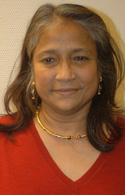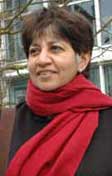SWEDISH SOUTH ASIAN STUDIES NETWORK
Gender and Development Network (Gadnet) c/o School of Global Studies, Gothenburg University
Postal address: Institutionen för Globala Studier, Box 700, SE-405 30 Göteborg
Visiting address: Rektorsvillan/Seminariegatan 1
Web page: http://www.globalstudies.gu.se/english/cooperation/gadnet/
Contact persons: Gunilla Blomqvist and Nina Gren, project coordinators
GADNET has evolved out of Global Gender Studies, formally established as the Centre for Global Gender Studies (CGGS), a unit at Göteborg
University, within its School of Global
Studies, on 1 January 2004.
Its history, however, dated back many
years. In 1993 the first took root in a multi-disciplinary feminist
seminar, Femfo, which started, based at the Dept.
of Peace and Development Research (PADRIGU).
In June 2003 Prof. Gita
Sen from the the Centre
for Public Policy at the Indian Institute of Management, Bangalore,
India, inaugurated
the Network for Global Gender Studies, that later evolved into CGGS.
The South Asia oriented researcher Dr. Monica
Erwér from the Dept. of Peace and Development Research (PADRIGU) became the first Deputy Director for CGGS. She was also first Coordinator for the Swedish
Gender and Development Network (GADNET), established in 2004, see below.
Since August 2009, Dr. Erwér works as Team Leader for the Swedish non-governmental organisation Svalorna Indien-Bangladesh (The Swallows India Bangladesh section) an organisation headquartered at Lund, and working mainly with local organisations in Tamil Nadu (India) and in Rajshahi district (Bangladesh). More information about The Swallows India Bangladesh.
Other South Asia oriented researchers working with CGGS are Dr. Gunilla Blomqvist, and Dr. Marie Thynell, both from PADRIGU. More information about their respective research, see the PADRIGU page.
 Naila
Kabeer, was a guest professor (Hasselgren Professorship)
at the Centre for Global Gender Studies in 2004 (up to 15 January 2005),
but is now back to her ordinary position as Research Fellow at the Institute
of Development Studies, Sussex, UK. She is however still closely engaged
with PADRIGU, and is a member of the board for the Centre for Global Gender
Studies.
Naila
Kabeer, was a guest professor (Hasselgren Professorship)
at the Centre for Global Gender Studies in 2004 (up to 15 January 2005),
but is now back to her ordinary position as Research Fellow at the Institute
of Development Studies, Sussex, UK. She is however still closely engaged
with PADRIGU, and is a member of the board for the Centre for Global Gender
Studies.
Kabeer who comes from Bangladesh is a social economist and works primarily
on poverty, gender, and social policy issues. She is the author of books
such as ”Reversed Realities: Gender Hierarchies in Development
Thought” (Vero 1994) and ”The Power to Choose: Bangladeshi
Women and Labour Market Decisions in London and Dhaka” (Verso
2000). In 2003 she published ”Gender Mainstreaming in Poverty
Eradication and the Millennium Development Goals – a handbook for
policy makers and other stakeholders” at IDRC
Books, the publishing arm of Canada's International Development Research
Centre).
Gender and Development Network (GADNET)
Web page: http://www.globalstudies.gu.se/english/cooperation/gadnet/
GADNET Newsletters: http://www.globalstudies.gu.se/english/cooperation/gadnet/newsletters/
The first major project within the CGGS was to initiate the national Gender and Development Network (GADNET) for which CGGS received Sida/SAREC funding for the period 2004-09. GADNET has developed into being a multidisciplinary national network of Swedish researchers and doctorate students with specific research interests in gender and development. It was launched in April 2004 and even though it is institutionally based ay CGGS, Göteborg University, is also organises activities such as seminars and conferences all over Sweden, via key contact persons (called nodes) at different universities and university colleges. These are supposed to form sub-divisions of the national network. More information on GADNET’s organisation.
In 2009, GADNET created a sub-network entitled GADIP. Its role should be to bridge the
gap in knowledge and experiences between
scholars and practitioners, building on excellent contacts
with researchers, networks and practitioners
in Europe and the South. Activities include bi-annual combined
GADNET/GADIP workshops that will be arranged
on highly topical issues, for instance on ’Gendered Migration’ (planned for the spring 2010). Keynote
speakers will be renowned researchers and
activists.
On December 1, 2009, the Research Secretariat at the Swedish International Development Cooperation Agency (Sida) decided to award SEK 500 000 to GADNET as a networking grant to run its sub-network GADIP during the period 2010–2012.
It is one out of four new networks getting funding from Sida in 2009, with a mission to bridge the gap between researchers and development work practitioners in Sweden. See the list of networks supported by Sida 2009.
GADNET arranges yearly Dream Catcher
workshops, as they are called.
The first workshop arranged in August 2004 focused on ”Citizenship,
rights and gender justice”. More than forty members of GADNET
attended, and the speakers at the workshop included internationally renowned
researchers and activists, i.e. Prof. Drude Dahlerup, Prof. Naila Kabeer
and Ms. Muthoni Wanyeki, the former executive director of FEMNET. The
2004 DreamCatcher was in itself a follow-up to another conference arranged
in August 2002 on ”Gender and power”, also visited
by Naila Kabeer (research fellow at IDS Sussex).
28 February– 2 March 2005, GADNET organised a major conference
in Göteborg on ”Negotiating Gender Justice Conference”,
to which 12 invited researchers from the South contributed. The conference
focused on gender relations in countries in the South and aims at exploring
how meanings of gender justice are negotiated at all levels of society,
in parliaments as well as in bedrooms, and aimed at initiating sustainable
contacts between researchers in Sweden and their colleagues in the South.
 GADNET organised a workshop on ”New Challenges for
Gender Justice fundamentalisms, markets and rights” in Uppsala
10–11 November 2005. The workshop, hosted by the Collegium for
Development Studies at Uppsala University and the Nordic Africa Institute,
discussing gender politics and efforts towards ‘gender justice’ at
different sites and scales in different countries. Among the lecturers
were Shahra
Razavi (photo to the right), Research Coordinator at
the United Nations Research Institute for Social Developmnent (UNRISD)
in Geneva; and Prof. Saraswati Raju, Centre
for the Study of Regional Development, Jawaharlal Nehru University,
New Delhi, India. Venue: Nordic Africa Institute, Uppsala. More
information on the workshop.
GADNET organised a workshop on ”New Challenges for
Gender Justice fundamentalisms, markets and rights” in Uppsala
10–11 November 2005. The workshop, hosted by the Collegium for
Development Studies at Uppsala University and the Nordic Africa Institute,
discussing gender politics and efforts towards ‘gender justice’ at
different sites and scales in different countries. Among the lecturers
were Shahra
Razavi (photo to the right), Research Coordinator at
the United Nations Research Institute for Social Developmnent (UNRISD)
in Geneva; and Prof. Saraswati Raju, Centre
for the Study of Regional Development, Jawaharlal Nehru University,
New Delhi, India. Venue: Nordic Africa Institute, Uppsala. More
information on the workshop.
 13–15
December 2006, GADNET organised a Global conference on
”A World in Transition – New Challenges for Gender
Justice” in New Delhi, India, conference, continuing
the exploration of gender justice begun during the first international
conference “Negotiating Gender Justice”, held in Göteborg,
Sweden in 2005 (see above). The New Delhi conference was
organised in collaboration with the Centre
for Women’s Development Studies (CWDS).
Keynote speakers were Dr. Vina Mazumdar, Founder of the Centre
for Women’s Development Studies, New Delhi; Prof. Ulla
Björnberg, Department of Sociology, Göteborg University;
Dr. Anupama Roy, Centre for Women’s Development Studies, New
Delhi; Dr. Ritu Menon,
Women Unlimited, New Delhi; Dr. Adriana Ortis-Ortega, Women’s
Studies, El Colegio de Mexico, Mexico; Prof. Jayati
Ghosh, Centre for Economic Studies and Planning, Jawaharlal Nehru
University, New Delhi; Dr. Tejaswini Niranjana (photo
to the right),
Director, Centre for Study the Study of Culture and Society, Bangalore;
and Prof. Kim Eun-Shil, Department of Women’s Studies, Asian
Centre for Women’s Studies, Seoul, South Korea. The conference
was exclusively open for GADNET members and by CWDS invited researchers.
13–15
December 2006, GADNET organised a Global conference on
”A World in Transition – New Challenges for Gender
Justice” in New Delhi, India, conference, continuing
the exploration of gender justice begun during the first international
conference “Negotiating Gender Justice”, held in Göteborg,
Sweden in 2005 (see above). The New Delhi conference was
organised in collaboration with the Centre
for Women’s Development Studies (CWDS).
Keynote speakers were Dr. Vina Mazumdar, Founder of the Centre
for Women’s Development Studies, New Delhi; Prof. Ulla
Björnberg, Department of Sociology, Göteborg University;
Dr. Anupama Roy, Centre for Women’s Development Studies, New
Delhi; Dr. Ritu Menon,
Women Unlimited, New Delhi; Dr. Adriana Ortis-Ortega, Women’s
Studies, El Colegio de Mexico, Mexico; Prof. Jayati
Ghosh, Centre for Economic Studies and Planning, Jawaharlal Nehru
University, New Delhi; Dr. Tejaswini Niranjana (photo
to the right),
Director, Centre for Study the Study of Culture and Society, Bangalore;
and Prof. Kim Eun-Shil, Department of Women’s Studies, Asian
Centre for Women’s Studies, Seoul, South Korea. The conference
was exclusively open for GADNET members and by CWDS invited researchers.
In 2008, GADNET organised a Dreamcatcher conference 6–7 March at Lund University. It was titled "Gender, Religion and Development", and was organised by the researchers Sidsel Hansson and Monica Lindberg Falk, Centre for East and South-East Asian Studies, Lund University.
The 2009 GADNET Dreamcatcher/GADIP workshop was entitled ”Gendered Resistance at times of Economic Crisis”. It was held at the School of Global Studies, University of Gothenburg on Friday 30 October 2009. More information.
SASNET - Swedish South Asian Studies Network/Lund
University
Address: Scheelevägen 15 D, SE-223 70 Lund, Sweden
Phone: +46 46 222 73 40
Webmaster: Lars Eklund
Last updated
2011-04-08
